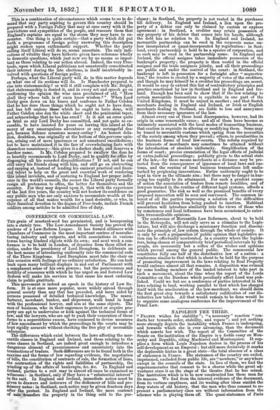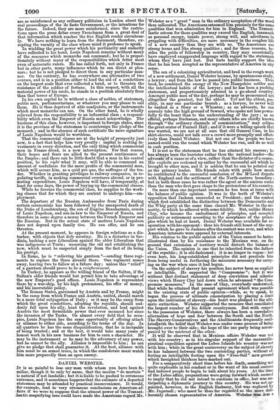NAPOLEON THE THIRD.
" FBARCE wishes for stability "; "a necessary" reaction "con- ducts her towards order, stability, and repose"; • and yet nothing more strongly depicts the instability which France is undergoing, and towards which she is ever advancing, than the document which asserts her wish. The report of the Committee of the Senate on the institution of the Empire is a feeble essay on Mon- archy and Republic, citing Machiavel and Montesquieu. It sup- plies a form which Louis Napoleon desires in the process of has self-development as an Emperor ; but still more decisively it marks the deplorable hiatus in a great state—the total absence of a class of statesmen in France. The statesmen of the country are exiled, imprisoned, excluded from public life, are "nowhere, ' or anywhere except in the councils of the state. In lieu of them, we find the supernumeraries that consent to be a chorus while the great ad- venturer stars it on the stage of the theatre that he has seized. The institution which is to be now constructed has these men for its masons. We find from the internal evidence of the document, from its verbose emptiness, and its wading after ideas amidst the deep waters of old history, that the men who thus consent to re- present a parliamentary class are without information from the schemer who is playing them of The quasi-statesmen of Paris are as uninformed as any ordinary politician in London about the real proceedings of the de facto Government, or-the intentions for the future. Indeed, they are more uninformed, since 'the restric- tions upon the press debar every Frenchman from a great deal of that information which reaches the free English reader circuitous- ly. We have nothing to learn from the document, therefore, ex- cepting.the vacuity of the class whose mind it professes to speak. In wielding the great power which his pertinacity and audacity have collected to his hand, Louis Napoleon remains without many of the resources which monarchs can command; but he is propor- tionately without many of the responsibilities which fetter moat even of autocratic rulers. He has called forth, not only in France but in other parts, many influences which he can direct at plea- sure; but he is not pledged to direct-them in any particular man- ner. On the contrary, he has everywhere one alternative of two courses, and is in a position either to lend the aid of a condottiere on the largest scale that ever collected a band, or to threaten the resistance of the soldier of fortune. In this respect, with all the material power of his uncle, he stands in a position absolutely freer than that terror of Europe.
In his own capital he is without a class of nobles, of statesmen, public men, parliamentarians, or whatever you may please to call. them. He is thus deprived of able coadjutors, or the instruments which moat monarchs can use. On the other hand, he is wholly relieved from the responsibility to an influential class ; a responsi- bility which even the Emperor of Russia must acknowledge. The business of this class, however, is important to foreign states, since it is the province of the statesman to countersign the pledge of the monarch ; and in the absence of such certificate the mere signature of Louis Napoleon would be worthless.
That the commercial classes are at the height of prosperity just now, is a fact that helps 'him very greatly : capital is seeking in- vestments in every direction, and the only thing which commercial men in France dread, is a new interruption. For that reason, their ,hopes and fears are allied to the present continuance of the Empire ; and there can be little doubt that a man in. his central position, be his right what lit may, will be able to command an amount of usefulness for the mere profits of the commercial man, which will secure him, as a quid pro quo, the suffrages of the tra- der. Whether in granting privileges to railway companies, in re- gulating tariffs, in making commercial overtures abroad, or in pro- moting expenditure, Louis Napoleon will have, if temporarily, at least for some days, the power of buying up the commercial classes.
While he favours the commercial class, he supplies to the work- ing classes that for which 'they are content to undergo him—em- ployment.
The departure of the Russian Ambassador from-Paris during certain ceremonials has been followed by the unexpected death of the Duke of Leuchtenberg, the son of Eugene Beauldiumais, cousin of Louis Napoleon, and son-in-law to the Emperor of Russia, and therefore in some degree a nexus between the'French Emperor and the Russian. But in the actual state of matters Louis isTapoleon does not depend upon family ties. He can offer, and he can threaten.
At the present moment, he appears in foreign relations as a dis- turber, with objects that defy scrutiny. He is a disturber in Sar- dinia, backing a new. Liberalism against the older Liberalism that was indigenous at Turin; unseating the old and establishing the new, which must be suspected simply from the fact of its being his protege.
In Rome, he is "relieving his garrison "—sending three regi- ments to replace the three already there. One regiment comes away, leaving two to follow at a future day; unless this " relief " of a garrison should prove to be a reinforcement.
In Turkey, he appears as the willing'friend of the Sultan, if the Sultan's older friends would but ,permit him to take advantage of the new Emperor's good offices. Louis Napoleon is represented there by a war-ship, by his high pretensions, his offer of money, i and his inscrutable policy.
The Boman States, garrisoned by Austria and by Trance, might be the camp from which France and Austria, united, should march to a more total subjugation of Italy ; or it may be the camp from which the great condottiere, adopting the republic, should sud- denly fall upon his ally, head the revolution, and lead against Austria the most formidable power that ever menaced her since the invasion of the Turks. On almost every field that he occu- pies, Louis Napoleon has the same opportunity of offering attack or alliance to either side, according to the terms of the day. In all quarters he has the same disqualification, that he is incapable of being trusted; and at the best, it would take many years of honest work in his new business for him to earn a character. He may be the instrument or he may be the adversary of any power, but he cannot be the ally. Alliance is impossible to him ; he can give no pledge that shall guarantee it. At the best, alliance with him must be an armed truce, in which the confederate must watch him more preparedly than an open enemy.



























 Previous page
Previous page